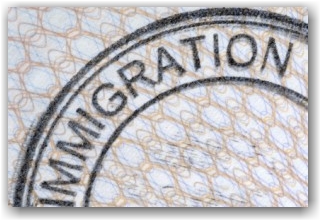Archive for the ‘Immigration Legislation’ Category
Tuesday, July 3rd, 2012
By: Timothy Sutton, Communications Editor
 My grandmother turns ninety-two years old this Fourth of July. Born and raised in Hawaii, she is one of seven daughters of an immigrant Chinese farmer. She grew up speaking Chinese, but raised her children to be American. To her, being American is more than just eating hamburgers instead of Chinese food; it is a love affair with endless possibilities. A bank teller, married to a butcher, my grandmother sacrificed all financial possessions to support her children’s education. The result: a doctor, an engineer, a certified public accountant, and two Ph.Ds.
My grandmother turns ninety-two years old this Fourth of July. Born and raised in Hawaii, she is one of seven daughters of an immigrant Chinese farmer. She grew up speaking Chinese, but raised her children to be American. To her, being American is more than just eating hamburgers instead of Chinese food; it is a love affair with endless possibilities. A bank teller, married to a butcher, my grandmother sacrificed all financial possessions to support her children’s education. The result: a doctor, an engineer, a certified public accountant, and two Ph.Ds.
America is a collection of success stories like my grandmother’s. We are a nation born out of a common struggle to establish a greater good for all. Our history may be shorter than many nations, but our progress is unparalleled.
Our strength and unity have made us a great nation that continues to rapidly progress. Our youth are both bright and ambitious. Over the last ninety-two years, my grandmother has participated in the most amazing experiment of freedom and personal liberty the world has ever known. This Independence Day, while the rockets cascade vibrant red, white, and blue hues across the night sky, another great American will be born; who knows what endless possibilities they may achieve over the next ninety-two years?
Tags: America's Promise, Americans, Comprehensive Immigration Reform, Congress, Immigration Compliance Group, Immigration News, Immigration Reform, Independence Day, July 4th, Naturalization
Posted in Comprehensive Immigration Reform, Congress, Global Immigration, Immigration Legislation, Immigration News, Naturalization | Comments Off on America’s Future is Brighter than Fireworks
Thursday, May 24th, 2012
By: Timothy Sutton, Communications Editor
 Kansas Senator Jerry Moran (R-Kan.) has introduced a Senate Bill named S.3217 Startup 2.0, a bill to jump-start economic recovery through the formation and growth of new business, and for other purposes. Numerous senators support Startup 2.0, which will infuse the skilled labor market with an additional 50,000 visas for immigrants with post-baccalaureate degrees in any field listed with the Department of Homeland Security STEM Designated Degree Program (science, computers, and medicine). Applicants can be students seeking degrees or professionals practicing in any of the enumerated STEM fields.
Kansas Senator Jerry Moran (R-Kan.) has introduced a Senate Bill named S.3217 Startup 2.0, a bill to jump-start economic recovery through the formation and growth of new business, and for other purposes. Numerous senators support Startup 2.0, which will infuse the skilled labor market with an additional 50,000 visas for immigrants with post-baccalaureate degrees in any field listed with the Department of Homeland Security STEM Designated Degree Program (science, computers, and medicine). Applicants can be students seeking degrees or professionals practicing in any of the enumerated STEM fields.
Additionally, Startup 2.0 allocates 75,000 visas for qualified entrepreneurs who (1) hold a nonimmigrant visa or have or will complete a STEM listed degree, (2) register a business that employs two or more full-time non-relative employees and invests or raises at least $100,000 that (3) grows the business to an average of five employees within a three year period.
At first glance, Startup 2.0 is a positive indicator that immigration reform may be shifting toward pro-business legislation. This bill would create access to citizenship for educated foreign entrepreneurs who may lack the funding necessary to apply for an EB-5. Startup 2.0 may also free up the quota on H1-B visas, particularly the Master’s degree exception. The current H1-B quotas as of May 18, 2012 are 42,000 for the H-1B regular cap (65,000 quota) and 16,000 for the US Master’s Degree cap (20,000 quota). The cap is expected to be reached within 2-3 weeks.
To stay informed about the latest immigration news and updates subscribe to our blog and immigration and I-9 newsletters here.
Tags: H-1B Quota, H-1B Visas, Investor Visas, Jerry Moran (R. Kansas), S.3217, Skilled Labor Market, Skilled Workers, Specialty Occupations, Startup 2.0, STEM Designated Degrees, STEM Students
Posted in Department Of Homeland Security (DHS), H-1B Visas, Immigration Legislation, Immigration News, USCIS | Comments Off on Senators Support STEM Immigration Bill | Immigration Compliance Group News
Monday, May 21st, 2012
By: Timothy Sutton, Communications Editor
 Since February of 2011, the U.S. Department of Homeland Security, Immigration and Customs Enforcement, as well as the office of the U.S. Attorney for the District of Columbia, have been conducting investigations into Chipotle Mexican Grill’s compliance with employee work authorization laws and regulations. On May 17, 2012, Chipotle received a subpoena from the U.S. Securities and Exchange Commission, requesting information regarding compliance with employee work authorization requirements, related public statements and other disclosures.
Since February of 2011, the U.S. Department of Homeland Security, Immigration and Customs Enforcement, as well as the office of the U.S. Attorney for the District of Columbia, have been conducting investigations into Chipotle Mexican Grill’s compliance with employee work authorization laws and regulations. On May 17, 2012, Chipotle received a subpoena from the U.S. Securities and Exchange Commission, requesting information regarding compliance with employee work authorization requirements, related public statements and other disclosures.
Failing their initial ICE audit exposed Chipotle to the SEC violations under investigation. Even though a year has passed since the company released immigration compliance disclosures to their investors, the current SEC investigation may lead to further fines and federal litigation. In February of 2011, the company filed a Form 8-K with the SEC stating,
“Our business could be adversely affected by increased labor costs or difficulties in finding the right employees for our restaurants.” Unauthorized workers are subject to deportation and may subject us to fines or penalties, and if any of our workers are found to be unauthorized our business may be disrupted as we try to replace lost workers with additional qualified employees. We could also experience adverse publicity arising from immigration-related enforcement activity that negatively impacts our brand and may make it more difficult to hire and keep qualified employees.”
The current SEC investigation has reopened the wound left by the ICE audits Chipotle endured over the past two years. Following the ICE raids of 2010, Chipotle restaurants in Minnesota were issued a Notice of Suspect Documents identifying a large number of employees who appeared not to be authorized to work in the U.S. Employees who were unable to provide valid work eligibility documents were terminated. In December 2010, DHS requested work authorization documents for employees in the District of Columbia and Virginia. At that time, Chipotle filed a statement with the SEC in a Form 10-K stating:
“We believe our practices with regard to the work authorization of our employees, including the review and retention of work authorization documents, are in compliance with applicable law. However, the termination of large numbers of employees does disrupt our operations and results in a temporary increase in labor costs as we train new employees. It is not possible at this time to determine whether we will incur any fines, penalties or further liabilities in connection with these matters.”
The Department of Homeland Security, ICE, and the SEC’s investigation of Chiptole, sends a strong message to American employers that the U.S. government is relentless in its efforts to penalize employers of illegal aliens. ICE audits open the door to immigration, tax, and labor investigations that can cost employers (companies of all sizes – both private and public) millions in fines. In particular, this is a strong message to publicly held corporations that you must take care now more than ever to ensure workforce compliance to avoid falling victim to an SEC probe.
As the mountain of immigration compliance trouble casts a shadow over Chipotle’s recent financial successes, further fines, penalties and liabilities levied by the SEC are sure to follow. For more updates on this matter subscribe to our RSS feed and for more information on how to avoid ICE audits and SEC investigations contact one of our immigration professionals at info@immigrationcompliancegroup.com or call 562 612.3996.
Tags: Chipotle Form 10K, Chipotle Form 8K, Chipotle Mexican Grill, Chipotle SEC Investigation, EMPLOYMENT ELIGIBILITY, Employre Compliance, I-9/E-Verify News, ICE, ICE Audits, Immigration compliance, Legal Workforce, SEC
Posted in I-9/E-Verify News, ICE, Immigration Legislation, Immigration News | Comments Off on SEC & ICE Tag-Team Chipotle Mexican Grill | Immigration Compliance Group News
Thursday, May 17th, 2012
By: Timothy Sutton, Communications Editor
The Hamilton Project, at the Brookings Institution held a forum on U.S. immigration on May 15, 2012. US Davis Economist,  Giovanni Peri, purposed a radical overhaul to the entire immigration system. In short, Peri proposed a national auction system wherein employers bid for employee visas and proceeds of these sales fund local healthcare and education. The auction prices would be set with a reserve to ensure a minimal guaranteed income stream. Uncapped, the market would dictate the number of visas issued annually. This proposal seems to find a common ground between business needs and government regulation, benefiting the low-skilled labor market.
Giovanni Peri, purposed a radical overhaul to the entire immigration system. In short, Peri proposed a national auction system wherein employers bid for employee visas and proceeds of these sales fund local healthcare and education. The auction prices would be set with a reserve to ensure a minimal guaranteed income stream. Uncapped, the market would dictate the number of visas issued annually. This proposal seems to find a common ground between business needs and government regulation, benefiting the low-skilled labor market.
Auctioning low-skilled labor visas should help reduce the population of roughly 11.5 million illegal immigrants. Employers will be able to hire a legal workforce up to the point where auction prices for visas offset low wage savings. At that time, I-9 audits and workplace raids should continue to deter further hiring of illegal immigrants. This larger, stable and legal temporary workforce will help stabilize the economy. Changes are welcomed for companies like 3M that recently experienced a “brain drain.” 3M has been outsourcing science and technology jobs to Asia, citing the instability of the low skilled labor market they rely on to support their laboratories, manufacturing, research and development.
While Peri’s proposals are likely years away from actually being introduced into legislation, public officials like Senator John Cornyn continue to push for business friendly immigration. Senator Cornyn recently introduced legislation that would add 85,000 H-1B temporary visas issued annually to foreign-born engineers, mathematicians, scientists and other high-tech workers. Cornyn reminded the Senate, “We have to remember how this country was built. All of us are sons and daughters of immigrants that showed up here and made our way. We’ve cut off that flow.”
For continued coverage of proposed immigration reform and legislation, as well as the latest developments in immigration politics, subscribe to our blog and immigration and I-9 newsletters here.
Interested in staying current with I-9/E-Verify news and issues? Check out our group on LinkedIn.
Tags: Brookings Institute, H-1B Quota, H-1B Visas, I-9 Form, I-9/E-Verify News, I-9/E-Verify News, Immigration Compliance Group, Immigration Legislation, Immigration News, Immigration Politics, Immigration Reform, Legal Workforce, Senator Cronyn, Skilled Workers
Posted in H-1B Visas, I-9/E-Verify News, ICE, Immigration Legislation, Immigration News, USCIS | Comments Off on Immigration Reform: The Future Of Immigration Policy…Visa Auctions?
Monday, May 14th, 2012
 By: Timothy Sutton, Communications Editor
By: Timothy Sutton, Communications Editor
State legislatures in Kansas recently voted down a bill that would mandate all employers utilize the E-verify employment verification system. The federal government currently encourages employer’s voluntary participation in E-verify under the Illegal Immigration Reform and Immigrant Responsibility Act of 1996 (IIRIRA). Although there are numerous benefits to participating in E-verify, blanket mandates burden all businesses regardless of size and resources. Legislatures across the country are proposing these mandates in an attempt to target employers who wish to remain “willfully blind” to their employees immigration status. The Kansas bill proposed excluding contractors who did not participate in E-verify from bidding on government contracts valued at $50,000 and above. When the bill failed by a vote of 84-35 businesses across the state heaved a temporary sigh of relief. Kansas will likely see this bill return in the near future, as the main deterrent for passing the bill was a lack of time and resources to adjust the state budget that takes effect on July 1, 2012.
Employers should be aware that although the federal government controls immigration laws, states are currently placing additional restrictions on employers adding additional layers of compliance measures aimed at reducing illegal immigrant populations. Controversial immigration laws passed by the state of Alabama, which mandate employer’s participation in E-verify, have sparked lawsuits by the Obama administration. Various industries are hit hard by such mandates including the agricultural industry.
Numerous farmers have prepared for a significant reduction in available labor by planting crops that can utilize machines to perform the work in place of immigrant laborers. H.B. 87, which recently passed in the state of Georgia, requires that all public employers and private employers utilize E-verify in advance of securing business licenses and permits. While these mandates appear to keep employers “honest,” in their hiring practices, they come at both an economic and social cost. Businesses bear the economic burden of compliance while minority populations pay the social cost of increased racial discrimination.
Mandates create an additional layer of workplace compliance that many small businesses lack the manpower and training to adhere to. Additionally, workplace verification screening without proper guidance by attorneys or employment specialists may lead to an increase in discriminatory employment practices. In light of the growing trend of state laws mandating E-verify participation, employers are encouraged to seek trained professionals for training and education on compliance with the law. For more information contact one of our immigration professionals at info@immigrationcompliancegroup.com or call 562 612.3996.
Tags: E-Verify, Georgia H.B 87, I-9 Form, I-9/E-Verify News, I-9/E-Verify News, ICE, ICE Audits, Kansas E-Verify Bill, Legal Workforce, State Legislatures, Undocumented Workers
Posted in I-9/E-Verify News, ICE, Immigration Legislation, Immigration News | Comments Off on E-Verify: State Legislatures Push For E-Verify Mandates | News from Immigration Compliance Group
Friday, May 4th, 2012
By: Timothy Sutton, Communications Editor 
On May 3rd, 2012, the President reassured the nation of his dedication to reforming U.S. immigration policies. In his speech, President Obama insisted that upon re-election, he would immediately overhaul the current immigration system. Of late, the DREAM act, a pathway for un-documented students to achieve citizenship, has been at the forefront of immigration politics. But while politicians argue over issues regarding individual rights to obtaining U.S. citizenship, businesses are left wondering where they fit into the proposed immigration “system-overhauls.”
Over the last two years, the dramatic increase in I-9 audits by the current administration have been well documented on this and other blogs. Additionally, the White House website clearly outlines the President’s vision for immigration reform, “Demanding accountability for businesses that break the law by undermining American workers and exploiting undocumented workers.”
This week, HerbCo, an agricultural business in the state of Washington, received $1,000,000 in fines for hiring illegal workers. HerbCo Management also received sentences of five years probation after entering guilty pleas to the criminal charges against them. A week prior, a restaurateur in Oakland, California was sentenced to 41 months in prison for improperly reporting the wages of over one hundred illegal workers to the IRS.
These hefty penalties reflect the seriousness of President Obama’s demands for business accountability. If the pathway to legal citizenship becomes more accessible to children, will businesses shoulder more of the blame for facilitating the illegal immigration of their parents? Business owners under the current political climate cannot afford workplace verification non-compliance. For more information on how to prepare your business for upcoming changes to the U.S. immigration system contact our office at info@immigrationcompliancegroup.com or call 562 612.3996.
Tags: Comprehensive Immigration Reform, DREAM ACT, Employment Eligibility Verification, Guest Worker Visa, I-9/E-Verify News, Immigration Legislatoin, Legal Workforce, president obama, Unlawful Presence
Posted in Comprehensive Immigration Reform, Immigration Legislation, Immigration News | Comments Off on Immigration Politics: How Serious Are Demands? | News from Immigration Compliance Group
Thursday, February 23rd, 2012
 Top officials from the White House and the U.S. Citizenship and Immigration Services are in Silicon Valley for the week to solicit viewpoints and input from the start-up community on how the administration can improve the way it hands out visas to talented entrepreneurs who’ve landed funding to create new companies. While Obama is asking the question how he can improve the immigration process for foreign entrepreneurs, he’s stating to UniVision, “I’ve got 5 years left to solve immigration.” Our question is, must we really remain in the dark ages for 5 more years?
Top officials from the White House and the U.S. Citizenship and Immigration Services are in Silicon Valley for the week to solicit viewpoints and input from the start-up community on how the administration can improve the way it hands out visas to talented entrepreneurs who’ve landed funding to create new companies. While Obama is asking the question how he can improve the immigration process for foreign entrepreneurs, he’s stating to UniVision, “I’ve got 5 years left to solve immigration.” Our question is, must we really remain in the dark ages for 5 more years?
The article states that comprehensive immigration reform legislation continues to remain stalled in congress, as is specific bi-partisan legislation that attempts to address some of these start-up visa issues. So the Obama administration is left trying to make the most of the rules that it currently has on the books by re-interpreting a more accommodating implementation of those rules with fresh information gathered from the field. The consensus is that Obama lacks the conviction to use his executive authority in an election year on controversial immigration issues, and that this is simply PR. We say — this is exactly the time for him to use his executive authority anywhere he possibly can concerning immigration reform. We shall see if anything comes of this. More on this here.
Tags: Alejandro Mayorkas, Comprehensive Immgiration Reform, Congress, eb-5, Foreign Entrepreneurs, Global Mobility, H-1B, Immigration Reform, Investor Visas, IT Summit, L-1, SILICON VALLEY, Start-ups, USCIS, USCIS Director
Posted in Comprehensive Immigration Reform, Department Of Homeland Security (DHS), H-1B Visas, Immigration Legislation, Immigration News, L-1 Visa, USCIS | Comments Off on USCIS and White House Officials Head to Silicon Valley for IT Summit
Wednesday, November 30th, 2011
H.R. 3012, the Fairness for High-Skilled Immigrants Act, introduced on September 22, 2011 by Rep. Chaffetz (R-UT), eliminates the employment-based per-country cap entirely by fiscal year 2015 and raises the family-sponsored per-country cap from 7% to 15%.
On 10/27/11, the House Judiciary Committee held a markup and H.R. 3012 was reported favorably out of committee by a voice vote. An amendment from Rep. Lofgren (D-CA) that would make adjustments to the three year phase-in period was accepted. H.R. 3012 must next be scheduled for House floor debate which may occur in the next few weeks.
On 11/29/11 the House passed H.R. 3012, the Fairness for High-Skilled Immigrants Act by a vote of 389-15 with no additional amendments. The measure now moves on to the Senate for consideration.
Sen. Charles Schumer, D-N.Y., who heads the Senate Judiciary panel on immigration, said he planned to move the bill as quickly as possible in the Senate, “where we expect it to find overwhelming support.” He said the legislation would “remove outdated constraints that prevent us from attracting the kind of innovators who can create job growth in America.”
Crystal Williams, executive director of the American Immigration Lawyers Association, said the measure “makes the system a tiny bit fairer” and does “demonstrate that Congress can do something on immigration, however small.” She cited estimates that while someone from England might wait two or three years for a green card, an Indian could conceivably be on the waiting list for decades.
Under current law, no more than 7% of the visas issued per year in any one immigrant visa category can go to natives of any one country. On the employment-based immigrant visa side, natives of India and China face longer waits than natives of other countries, because natives of those countries send more high-skilled immigrants to the US than any other country. On the family-based immigrant visa side, natives of Mexico and the Philippines face longer waits than natives of other countries, because there are more immigrants and US citizens with family ties to those countries than there are to other countries. HR 3012 will eliminate, over a three year period, the per-country limit in the employment-based system, but it will not raise the number of legal immigrants allowed to enter the USA.
We will keep you posted on developments as this bill moves to the Senate. We link to an excellent article on the subject.
Tags: eb-2, eb-3, Fairness for High-Skilled Immigrants Act, Green-Card Country Limits, H.R. 3012, Immigrant Visas (I-140 Petitions), Immigration Legislation, PERMANENT RESIDENCY, Skilled Worlers
Posted in Immigrant Visas (I-140 Petitions), Immigration Legislation | Comments Off on House Votes to Eliminate Country Limits for Skilled Worker Green-Cards
Thursday, August 4th, 2011
Our August 2011 InFOCUS immigration newsletter is now available. We encourage you to sign up to receive our monthly news and Blog posts that report on immigration issues, employer compliance, policy and legislative issues, as well as Department of State and visa updates.
We invite you to continue to visit our website and our Employer Compliance Resource Center for the latest developments on key issues.
Tags: H-1B News, Healthcare Immigration News, Immigration Legislation, Immigration News, Immigration Solutions
Posted in Immigration Legislation, Immigration News, USCIS | Comments Off on Immigration News and Update
Friday, May 27th, 2011
It is not a surprise to see where the priorities are in the spending bill making its way through the House of Representatives. The House Appropriations Committee passed a Bill this week that will go to the floor of the House possibly next week. We highlight the money trail here:
USCIS: Approximately 1/3 of the requested funding was approved
- Fee Reform: The Administration’s fee reform effort would receive no funding. The Administration requested $207 million for the processing of refugee and asylum applications, for which there is no charge.
- Immigrant Integration: The Administration requested $19.75 million for immigrant integration programs and for the operations of the Office of Citizenship. The Committee rejected the request. In its report on the bill, the Committee noted that it “supports the efforts of the Office of Citizenship to promote civic education through the naturalization process.” Not, apparently, enough to provide funding for this purpose.
Enforcement
While the Committee couldn’t find any money for immigrant integration, costs concerns were not a factor in enforcement budgets. Customs and Border Protection got $8.77 billion—$44 million more than the President asked for in his budget, and more than half a billion dollars more than allocated in FY 2011. Within that amount, border security between ports of entry gets $3.62 billion, $191 million more than last year—enough to bring the Border Patrol up to 21,370 agents.
ICE was allocated $5.5 billion, $25.6 million more than the President requested and $84.8 million more than in 2011. Secure Communities got $194 million, $10 million more than the President requested. ICE Detention and Removal operations were awarded $2.75 billion, $26.7 million more than the President asked for, to raise the minimum number of detention bed spaces that ICE must maintain on a daily basis from 33,400 bed spaces to 34,000—and the Committee directs ICE “to intensify its enforcement efforts and fully utilize these resources.”
As part of his enforcement-only agenda, Representative Lamar Smith (R-TX) is expected to introduce a bill that would make the use of the E-Verify electronic work authorization verification system mandatory for all businesses in the U.S.
There is still no sign that Republicans who now control the Judiciary Committee (having jurisdiction over immigration) will attempt to seriously address any legal or illegal immigration reform to fix the broken system. Despite billions of dollars being spent on immigration enforcement, and enforcement “benchmarks” set in the last round of immigration reform, legislative efforts having been largely met and the Republicans continue to call for yet more enforcement. They continue to move the goalpost.
For more information on this subject, we link to, “E-Verify Without Reform Cannot Succeed,” and listen to a recording of a National Immigration Forum briefing for reporters on the E-Verify program.
For more on this as well as the mandatory E-Verify Bill expected in June, we link to the National Immigration Forum’s Policy Update
Posted in Customs & Border Protection(CBP), Department Of Homeland Security (DHS), I-9/E-Verify News, Immigration Legislation, USCIS | Comments Off on Immigration Solutions | DHS Spending Bill
 My grandmother turns ninety-two years old this Fourth of July. Born and raised in Hawaii, she is one of seven daughters of an immigrant Chinese farmer. She grew up speaking Chinese, but raised her children to be American. To her, being American is more than just eating hamburgers instead of Chinese food; it is a love affair with endless possibilities. A bank teller, married to a butcher, my grandmother sacrificed all financial possessions to support her children’s education. The result: a doctor, an engineer, a certified public accountant, and two Ph.Ds.
My grandmother turns ninety-two years old this Fourth of July. Born and raised in Hawaii, she is one of seven daughters of an immigrant Chinese farmer. She grew up speaking Chinese, but raised her children to be American. To her, being American is more than just eating hamburgers instead of Chinese food; it is a love affair with endless possibilities. A bank teller, married to a butcher, my grandmother sacrificed all financial possessions to support her children’s education. The result: a doctor, an engineer, a certified public accountant, and two Ph.Ds.



 By: Timothy Sutton, Communications Editor
By: Timothy Sutton, Communications Editor
